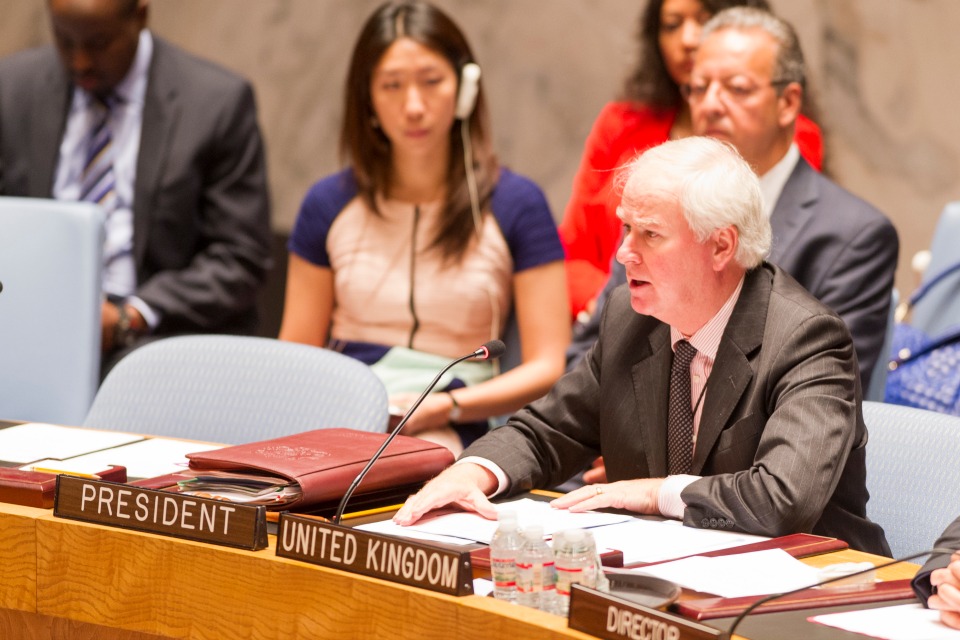"Sanctions remain a vital part of the Council’s toolbox."
Intervention by Ambassador Lyall Grant of the UK Mission to the UN, to the Security Council briefing on Sanctions

Mr President,
I thank Australia for convening this Briefing, and for its work on trying to improve the effectiveness of United Nations sanctions. Australia was one of the main sponsors and contributors to the recent High-Level Review of UN sanctions. And your efforts, Mr President, as Chair of the 1267, 1988 and Iran sanctions committees show clearly that you are putting theory into practice. I also thank Mr Feltman and the Secretary-General of Interpol for their briefings this morning.
Mr President,
As Mr Feltman set out, sanctions are a vital foreign policy tool that can contribute to achieving United Nations objectives: they are used to prevent conflict; human rights abuses; terrorism; and proliferation of weapons. They have made a critical and positive difference in situations from Afghanistan to Yemen.
Mr President,
It is incumbent on us to ensure that sanctions are used properly. This means designing them to have maximum and targeted impact and ensuring that they are implemented properly.
Each sanctions regime is designed to achieve its own specific objective and has its own specific challenges.
Sanctions have been used to support negotiations towards peace agreements and wider efforts to prevent conflict. We have seen this in the cases of Sierra Leone, Liberia and Cote d’Ivoire sanctions. Even the threat of sanctions, as we saw with the build-up to the eventual creation of the Yemen sanctions regime, can make spoilers to peace and security think twice about their actions.
Sanctions have also been used effectively to counter terrorism. The ability of al-Qaeda and other terrorist groups to operate has been significantly constrained by United Nations counter-terrorism sanctions. The United Nations has united to tackle ISIL and sanctions will help to degrade ISIL’s capability.
And counter proliferation sanctions have made it more difficult for some states to acquire goods that could aid the development of weapons of mass destruction. They have helped to restrict Iran’s access to proliferation sensitive materials and technologies. And with other economic sanctions they have been important in bringing Iran to the negotiating table. E3+3 discussions with Iran have made progress in recent days. We have explored with Iran ways to bridge some of the significant gaps that remain. Both sides are committed to a deal and we still believe that that is possible, but Iran needs to show greater flexibility on its programmes and to take some tough decisions if we are to achieve this. We need to sustain the momentum generated from recent rounds of discussion in order to secure the comprehensive agreement that is in everyone’s interest.
Mr President,
Given that sanctions are increasingly being relied upon to tackle a variety of challenges, it is important that we consider how to make best use of them.
The Sanctions Committees, Secretariat and Expert Groups all have a role to play in this. Their work should mutually reinforce each other. They should continue to work together to ensure that sanctions help to achieve the political goals set out by the Security Council. I welcome Mr Feltman’s recommendations to further improve sanctions procedures. We should look carefully at these recommendations.
In addition, the United Kingdom believes there is scope for Committees themselves to be more active. We suggest that all Committees should meet every six months at DPR level or higher. This would bring a periodic discussion at a more strategic level, which could be an opportunity to review some of the longer term aspects of the respective regimes: are we closer to achieving our goals; how might we adjust the regime; what can we learn from implementation efforts to date.
We also see scope for sharing best practice and lessons learnt across the regimes. Visits by experts from capitals can contribute to the debate. We welcome the efforts by the Presidency to set out ways to make best use of sanctions in a resolution. We strongly support this work and hope that we will be in a position to adopt such a resolution in the very near future.
Mr President,
Effective implementation is crucial. Without it, sanctions will not achieve their goals. It is worth restating that sanctions regimes established by the Council under Chapter VII of the Charter place obligations on all Member States. This is vital, for example, when it comes to choking off support for ISIL in line with the Presidential Statement agreed by this Council on 19 November.
Assistance on implementation should be made available to those unable to comply. Sharing information on challenges to effective implementation will help Member States in their own implementation.
And we should name and shame those Member States that do not implement sanctions properly.
Mr President,
We continue to be strong supporters of fair and clear procedures for United Nations sanctions regimes. For instance, we have supported the strengthening of due process provisions under the 1267 Al-Qaida regime, but no two regimes are alike so we need to tailor special solutions for each circumstance rather than replicating an identical approach for all regimes.
Mr President,
To conclude, sanctions remain a vital part of the Council’s toolbox. It is important that we continue to use sanctions in an appropriate manner: targeted and aimed at signalling, constraining or coercing actors towards peaceful ends. In this way, smart sanctions can continue to be used in the long-term as an effective tool of the Council in the support of the maintenance of international peace and security.
I thank you.